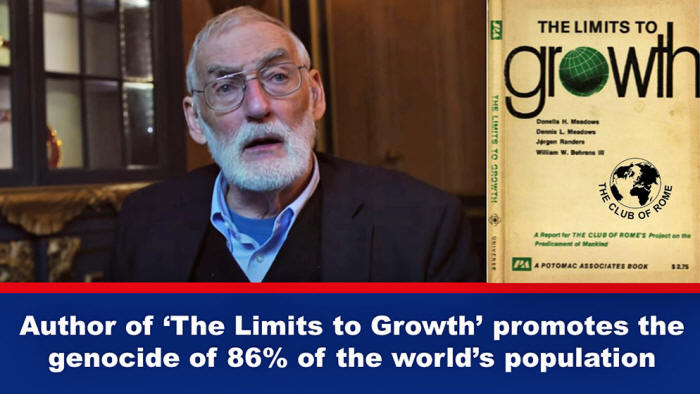|
Dennis Meadows, one of the main authors of the Club of Rome's 'The Limits to Growth,' is an honorary member of the Club of Rome and a member of the World Economic Forum (WEF).
If you thought his ideology had softened and become less anti-human since the publishing of his book, you'd be wrong.
Here's a 2017 far below video of Meadows, musing over his hopes that the coming inevitable genocide of 86% of the world population could be accomplished,
He said:
As will become apparent at the end of this article, it is no coincidence that Meadows' words echo the words in the 1995 Global Biodiversity Assessment first presented at the United Nations climate change conference COP1 which stated:
What the advocates of this ideology seem to omit mentioning is that, according to Worldometer, the population of the world is currently over 8 billion which doesn't stack up with their fear-mongering predictions.
There's a good reason they avoid real-world scenarios because their models are a sleight of hand, they manipulate the data.
While many are now familiar with the manipulation of predictive modeling by Neil Ferguson during the Covid-19 'crisis,' a network of powerful Malthusians have used the same tactics for the better part of the last century to sell and impose their agenda.
Malthusians are the disciples of Thomas Malthus (1766-1834).
Malthus promoted the mathematical thesis that population levels will always tend towards geometric growth, while agricultural resources will tend to arithmetic growth resulting in relatively forecastable "crisis points."
Malthus believed that social engineers representing the British Empire must use,
Malthus believed that nature bestowed upon the ruling class certain tools that would allow them to accomplish this important task, namely,
Established in 1968, the Club of Rome quickly set up branches across the Western world with members whom all agreed that society's best form of governance was a scientific dictatorship.
It is a globalist non-governmental organization ("NGO") that convenes meetings between,
Modeled after the "Round Table" structure of,
...the Club of Rome facilitates meetings where delegates plan the global economy through public-private stewardship of the world's natural and human resources in accordance with the Malthusian ecology of sustainable development.
In 1972, the Club of Rome's The Limits to Growth published the results of computer-simulated forecasts calculated by a team of statisticians recruited from the Massachusetts Institute of Technology ("MIT").
It was the culmination of a two-year study undertaken by the MIT team under the nominal heading of Jay Forrester and Dennis Meadows.
The Limits to Growth is arguably the most influential book about "sustainability."
The Club of Rome's The Limits to Growth is not only Malthusian in principle, but a survey of its bibliography reveals that it is also backed by extensive citations from an array of Malthusian-eugenicists and affiliated institutions that have been dedicated to population control.
A 2012 article celebrating the book's 40th anniversary stated:
It's worth revisiting Limits to Growth for other reasons as well.
One reason is that The Limits to Growth was the first of its kind to fuse global temperature with economic variables like population growth, resource loss, and the under-defined category of "pollution."
By utilizing linear equations to extrapolate trends into the future, Meadows and his co-authors, one of whom was his wife, had set the stage for two major fallacies:
Another reason to revisit The Limits to Growth is to highlight the influence it had and still has on supranational organizations.
For decades, New Age guru Barbara Marx Hubbard - who called for one-fourth of the human population to be culled to usher in a New World Order - championed transhumanism and Malthusian sustainable development, which is the crux of The Great Reset and the Fourth Industrial Revolution.
Hubbard's Malthusian overpopulation theories were partly inspired by The Limits to Growth.
In fact, in Hubbard's Book of Co-Creation, there are multiple passages which warn of Malthusian "limits to growth" that could lead to ecological catastrophes.
She also met personally with Club of Rome co-founder, Aurelio Peccei who prompted the World Economic Forum to adopt the Malthusian tenets of The Limits to Growth at the World Economic Forum's Third Annual Meeting in 1973.
Last, but not least, we have Club of Rome member and author of Limits to Growth, who manipulated his predictive modeling, hoping that a dictatorship will slowly and "peacefully" cull 86% of the world's population.
No one should be celebrating The Limits to Growth or the agenda it's promoting because it's promoting your demise...
Sources
|


